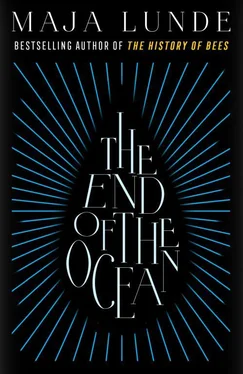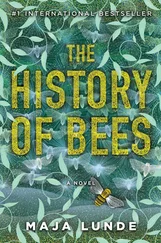That’s why I lied. For the first time in my life I lied. Some children can lie, they do it without thinking twice. It’s easy for them to say that they didn’t take the cookies from the jar or that they lost their workbook on the way home. But I wasn’t that kind of child, just like I was never a child who liked to imagine things; make-believe games and pretend worlds were not for me, and maybe for that reason, neither was lying. I had so far in my life not been in situations where I needed to lie, and I had also never considered the idea that it was actually possible, that a lie could solve something.
But now I did it, the lie pushed its way forward, because it was my fault, all of this, I thought, with cold toes and wet knee socks, with my chest full of cake rising towards my throat, my mouth, and I had to stop the look in Daddy’s eyes, that’s why I lied, I had to get him to take his hands out of his pockets and reach for Mommy.
I thought through the lie in a flash, made it up in my mind before I presented it. In a quiet voice I hoped sounded genuine, I said, “Yes, I remember it, Mommy. I wished for a birthday in the winter. I remember it.”
And to make it really respectable, to make the lie fully plausible, I filled my hands with rotten pearl sugar snow and held them out to Mommy, to Daddy.
“Thank you. Thank you for the ice.”
Now, I thought, now everything will certainly be fine. But nothing happened. One of the guests cleared his throat, softly. My cousin tugged at my aunt’s skirt, peered up at her, but all the adults just looked at me and waited, as if something more was supposed to happen.
That was when he came, Magnus, his feet moving quickly against the ground from the truck, over to me.
“I’ll help you,” he said.
He bent down; the hair on his young boy’s neck was close-cropped and his skin tanned. He took some ice between his hands and made a snowball that was much nicer than mine.
Those bare feet of his on the ice, it had to be freezing cold, but he didn’t seem to care, because now we were making a snowman together, out of the rotting, melting snow, and I no longer noticed all the others around us, all those still standing there watching.
“We need a nose,” he said.
“You mean a carrot,” I said.
“Yes, a nose.”
“But it’s actually a carrot,” I said.
And he laughed.
Timbaut, Bordeaux, France, 2041
The heat trembled above the road in front of us. It shimmered on the hilltop, like water, but disappeared as we approached.
We still didn’t see any sign of the camp.
Above us the sky was blue. Not a single cloud. Blue, always blue. I’d started to hate that color.
Lou slept against my arm, rocking gently as the truck drove over bumps in the asphalt. It had been a long time since anyone had done any road maintenance. The houses we passed were abandoned, the fields dry and scorched brown by the sun.
I turned my face towards Lou, sniffed at her head. Her soft, little-girl hair smelled of acrid smoke. The sour smell of fire was in our clothes, too, even though it had been many days since we left Argelès. Since we became half a family.
Twenty-two days—no, twenty-four. Already twenty-four days had passed. I had lost count. Wanted perhaps to lose count. Twenty-four days since we ran out of Argelès. Me with Lou in my arms. She cried. I ran until we could no longer hear the fire. Ran until the smoke was just a haze in the distance. Only then did we stop, turn towards the city and…
Stop, David. Stop. We are going to find them now. They are here. Anna and August will be in the camp. Because this was where Anna wanted to go. She had spoken about the place for a long time. It was supposed to be decent. There was food here and electricity from solar panels. And, not least, there was water. Clean, cold water from a faucet.
And from this camp it was supposed to be possible to continue north.
The driver put on the brakes. He drove onto the side of the road and stopped. Lou woke up.
“There,” he pointed.
In front of us was a military-green tarpaulin fence.
Anna. August.
The driver let us out. He mumbled “good luck” and drove away in a cloud of dust.
The air hit us like a hot wall. Lou blinked towards the sun, clinging to my hand.
The fireball in the sky sucked every drop of moisture out of me. The asphalt was burning. It was so hot it had to be on the verge of melting.
My phone was broken. My wristwatch had been bartered away. I didn’t know what time it was. But the fence before me still cast a short shadow, so it couldn’t be more than three.
I walked quickly. Now we would find them again. They had no doubt arrived here before us.
We reached the entrance. Two guards wearing military uniforms sat by a table.
They looked at us without seeing us.
“Papers?” one of them said.
“I’m looking for someone,” I said.
“Papers first,” the guard said.
“But—”
“Don’t you want to go inside?”
I placed our passports in front of him, but left Anna’s and August’s passports in the bag. The guard didn’t need to see that we had them. He would certainly only start asking questions.
He leafed quickly through the pages in my passport, stopped at the photograph. I was startled every time I saw it. The guy in the picture, was that me? Such round cheeks, almost chubby. Had the camera distorted my face?
No, that was just how I was at the time. Stout, not fat, merely in good health.
Or maybe normal, actually. Maybe that was how we all looked before.
He picked up Lou’s, it was newer, but Lou grew so fast. The child in the passport could have been anyone. Four years old when the photograph was taken. Smiling. Not as serious as she is now.
I had braided her hair this morning. I was good at it. Brushed it and divided it into two identical halves, with a sharp parting in between. Then I quickly made two tight braids that hung down her back. Maybe it was because of the braids we had finally been picked up by a driver. Now I hoped they distracted people, so they wouldn’t notice how dirty she was, and thin. So they wouldn’t notice her seriousness—she seldom smiled, my child. Before, she was the kind of child who was always jumping, running, skipping. But now the braids just hung down her back, completely still.
The guard continued looking at me. Clearly he was comparing me with the photo in the passport.
“It’s five years old,” I said. “I was only twenty.”
“Do you have anything else? Other papers that can confirm your identity?”
I shook my head.
“This was all I managed to take with me.”
He looked at the picture one more time, as if it could provide him with answers. Then he took out a stapler and two light-green slips of paper. With practiced movements he stapled them on random pages in the passports.
“Fill this out.”
He held it out to me.
“Where?”
“Here. On the form.”
“I mean… where? Do you have a table?”
“No.”
I took the passports. He had left mine open at the page with the green form.
“Do you have a pen, then?”
I tried to smile. But the guard just shook his head in resignation. His eyes did not meet mine.
“I’ve lost mine,” I said.
That wasn’t completely true. It wasn’t lost, the ink was used up. Lou had been crying so much the other night on the road, sobbing softly with her face hidden in her hands. I let her draw. She drew thick blue lines of ink on the back of an old envelope we found on the side of the road. Drew pictures of girls in dresses and colored in the skirts. She pressed the pen down so hard that it made holes in the paper.
Читать дальше










